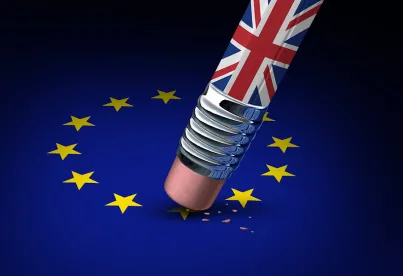Between April 20 and 24, the European Union (EU) and the United Kingdom (U.K.) conducted the second round of negotiations on their future trading relationship. Due to the coronavirus pandemic, the EU's chief negotiator, Michel Barnier, described the talks as slightly “surreal”. However, both the EU and U.K. remain keen to continue the talks, since two important deadlines are approaching this year.
Transition Period – Extension or Exit?
After the U.K. left the EU at the end of January (on so-called “Brexit day”), the U.K. entered into a transition period where they agreed to continue to follow all EU rules and participate fully in the Single Market and Customs Union. This will automatically cease to apply at the end of this year. If either side deems it necessary to extend (for instance, they decide that they haven’t made enough progress in negotiations), both sides would need to agree together on a new date for the end of the transition period.
As a result of the Withdrawal Agreement signed and ratified by both parties, any decision to extend must be taken by 30 June 2020. However, the U.K. Government maintains that they do not wish to extend this transition period, especially since refusing an extension has become politically significant.
If the U.K. and EU do not agree to an extension, then the transition period will automatically come to an end by law on 31 December 2020. On what terms the parties continue to trade beyond this point is still to be decided.
The Negotiations
With these dates in mind, this leaves less than eight months for the future relationship to be negotiated and ratified. However, during the second round of talks, both sides have said that limited progress was made.
The EU said that whilst the parties have identified areas where the positions of the two sides are close, the U.K. has “refused to seriously engage on a number of fundamental issues.” Similarly, a U.K. Government spokesperson has said that although there was limited progress on more uncontroversial areas, they “regret however that the detail of the EU’s offer on goods trade falls well short of recent precedent in FTAs [free trade agreements] it has agreed with other sovereign countries”.
Fundamental differences remain in areas such as maintaining a “level playing field” for competition, environmental, data protection and employment standards. The EU sees this as a key component of what they call an “ambitious economic partnership,” however the U.K. looks on proposals to keep the U.K. legally bound to remain directly in step with EU regulatory and legal developments as an infringement of its sovereignty to decide how to govern itself, particularly given the more relaxed approach taken by the EU in other FTAs signed with third countries. EU access to U.K. waters for fishing is also a significant (and politically symbolic) road block to an overall deal. The U.K. government has made environmental sustainability in fishing a key pillar of policy focus going forwards, and it is difficult at this point to see a way through to agreement that meets the EU’s demand for continued access to U.K. waters on their own terms.
There is also substantial discrepancy between the sides on what form an agreement should take. The EU has indicated it prefers a single comprehensive deal, whereas the U.K. would prefer a series of smaller sector-by-sector deals. Additionally, no progress has been made on the question of governance of the deal and adherence to a set of fundamental values. For instance, whether the European Court of Justice will be allowed jurisdictional supremacy over U.K. courts when it comes to matters relating to EU law (rather than deference to a neutral arbitrator), or whether the U.K. will agree to be constitutionally bound into continued membership of the European Convention on Human Rights.
Economic Trouble: No-Deal Reemerges With Covid-19
With such an expansive gap between the sides, and only two months left to decide whether an extension can happen, this opens up the risk that agreement for an FTA fails to be reached and the U.K. instead becomes a “Most Favoured Nation” (MFN) with trading arrangements with the EU falling under World Trade Organisation (WTO) rules. This would mean the U.K. becomes subject to the EU’s Common External Tariff (EU CET) on goods, which applies to all third nations without an FTA with the EU in place. These are high and would hit British exporters to the EU particularly hard as they would suddenly find themselves priced out of competition with rival businesses based in the EU. Similarly, from the EU’s perspective there is a risk that the U.K. decides its U.K. global tariff (UKGT) on goods should be similarly high for territories it trades with on WTO terms, although there are indications from government that the UKGT is likely to be set extremely low. Failing to agree an FTA would also result in U.K. financial institutions losing their automatic right of access to the Single Market and passporting. There are alternative routes for gaining access, such as through having EU subsidiaries or through authorisation being granted by the EU in the event that U.K. legislation is deemed to meet the test of “equivalence” to EU legislation. However, evidence from other third countries seeking equivalence determinations suggests that this could be a very lengthy process, which would add to uncertainty in the financial services sector.
Such an outcome would compound the significant economic shock currently being felt by the U.K. and EU economies due to the COVID-19 shutdown. In this scenario, U.K. and EU businesses would have two fundamental challenges in 2021. They would have to contend with an entirely new trading environment (in particular additional customs checks and tariffs) while also attempting to navigate treacherous economic waters as a result of the pandemic.
U.S. - U.K. Trade Talks
The U.K. is simultaneously negotiating its future relationship with countries outside the EU, including seeking to establish an FTA with the U.S., the EU having so far failed to do so. This week, the U.K. and U.S. governments have launched an initial round of talks. It is understood that this first round is due to last for about two weeks, with further rounds taking place on a rolling basis, starting every six weeks. For more information on this possible trade agreement, please see our article that outlines some of the potential benefits and challenges of the new U.S. - U.K. relationship.






 />i
/>i

